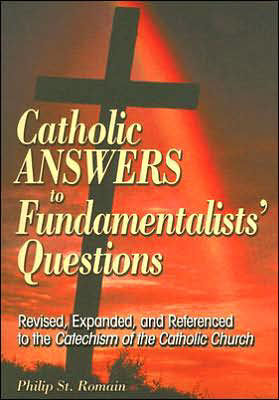
|
Posted June 14, 2006
Book: Catholic Answers to Fundamentalists' Questions Author: Philip St. Romain Liguori Press. Liguori, Missouri. 2005. Pp. 87 An Excerpt from the Jacket:
Among the basic areas of faith and practice covered in the book are Scripture and Tradition; teaching authority and papacy; salvation; Mass and holy Communion; devotion to Mary and the saints; creation, evolution, and original sin; and the Second Coming and Last Judgment. A new section provides practical guidelines for getting along. An Excerpt from the Book: Q. Surely Catholic doctrines have changed through the ages. Doesn't this mean that the Catholics have changed the meaning of Scripture to suit their traditions: Human culture has changed many times in the nearly two thousand years during which Christianity has been handed on. The sacred task of preaching the Gospel to every generation has made it necessary to spell out the unchangeable content of revelation anew in the changeable thought-forms and languages of people in every new era and culture. In this process of preaching and explaining the Gospel news, ecumenical councils play a key role. An ecumenical council - from the Greek Oecumenon meaning "the whole inhabited world" - is an official meeting by bishops and other ecclesiastical leaders of the world for the purpose of decision-making on matters of faith, morals, worship, and discipline. Ecumenical decisions are considered binding for the entire Church. The most recent ecumenical council, Vatican II, did what the teaching Church has always done: bring forward the unchangeable content of revelation, translating it into thought-forms of people in today's culture. Revelation has not changed, but our understanding of it has indeed changed and deepened. Under the guidance of the Holy Spirit, the Church continues to experience "growth in insight into the realities and words that are being passed on." Table of Contents: 1. What is biblical fundamentalism? 2. Catholics and the bible 3. Teaching authority and the papacy 4. Salvation 5. The mass and Holy Communion 6. Devotion to Mary and the saints 7. Creation, evolution, and original sin 8. Second coming and last judgment 9. Guidelines for getting along |
|
